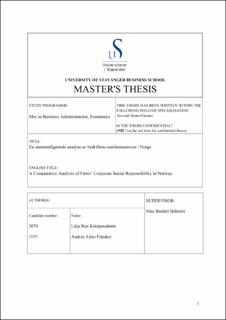| dc.description.abstract | Abstract
Corporate social responsibility (CSR) has been known throughout history, but has not until
recently been given a more important role in the companies' day-to-day operations. Measuring
companies' degree of corporate social responsibility through various CSR activities is a
challenge, and to what extent this will have an impact on sustainable development. This has
opened up the possibility of using environmental, social and governance (ESG) ratings as a
unit of measurement of the effect of corporate social responsibility. This thesis examines how
the ESG scores contribute to giving an indication of what level Norwegian industries are in
relation to their corporate social responsibility. This is supplemented by examining the
development of CSR, gaining a broader understanding of the definitions of CSR and what value
this adds to society, shareholders and stakeholders in connection to the ESG score. In addition,
a review was made of the various variables in the ESG score to gain a better understanding of
which elements in companies influence the score. A comparative analysis was performed of
descriptive statistics, evolution over time, correlation and t-test of ESG scores in 11 different
industries in Norway. Conducting these analyses, makes it possible to establish a better overall
understanding of which elements can affect companies' corporate social responsibility and what
differences and similarities these present. Based on the analysis, a comparison of CSR in
Norway reveals significant variances and similarities. The testing for significant difference
reveals that the majority of the industries within the environmental and social pillars are
statistically significantly different, while the majority of the industries within the governance
pillar score indicate equal means. Furthermore, there have been no obvious patterns in terms
of differences and similarities, either within or between industries. | |
